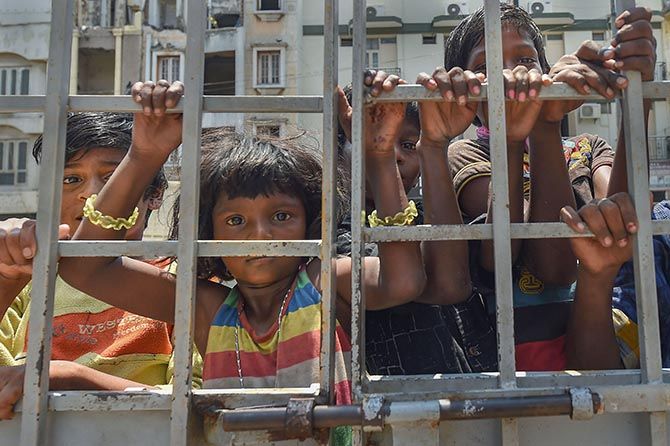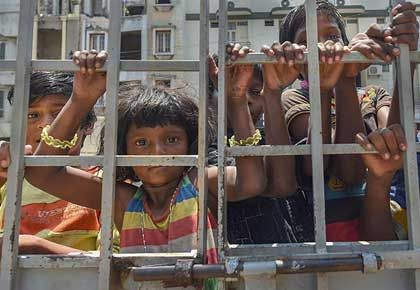India is going into the longest lockdown in the world, with the least amount of notice given to its people and the least preparation by its government, says Aakar Patel.

Many states wants the lockdown to be extended to the end of April, and it is possible that much if not most of India will continue the freeze.
What was the point of the lockdown?
We were not told this explicitly by the prime minister, but globally it is understood to serve two purposes.
The first is that it is time that is used for the State to build its capacity, especially for adding ventilators and intensive care units (ICUs).
The second reason is that a lockdown slows the spread of the virus.
The virus incubates in those it has infected and they can be identified and isolated.
Has India's lockdown been useful from these two points of view?
The answer to the first is that we have not used this time to build capacity.
A report in The Hindu on Saturday, April 11, said that: 'A countrywide shortage of medicines and medical devices is likely in the coming weeks, the Department of Pharmaceuticals has warned the Home Ministry, urging it to take immediate steps to help drug makers resume production under the current lockdown.'
Drug and medical device makers are functioning '...on an average, at only 20%-30% capacity during the lockdown," as per feedback from various industry formations, Department of Pharmaceuticals Secretary PD Vaghela pointed out in an April 9 communique to Home Secretary Ajay Bhalla.'
It was not clear why the government did not put special effort into ensuring that this production continued to at least function if not increase in scale.
Another report said that at a meeting of government officials it was revealed that possibly half of India's existing 40,000 ventilators were not working because of a lack of spare parts.
A third report in the Economic Times on March 24 said that ventilator manufacturers were crippled by the lockdown and unable to produce the machines.
All in all, we can assume that the government has not been able to use this time of the lockdown to build capacity.

The second reason for the shutdown is to slow the spread of the virus.
Have we been successful in this?
The lockdown was announced when we had about 500 cases, today we have over 9,000.
The escalation of the spread is constant except in one state (Kerala), where the spread is slower.
That could be interpreted as success or failure, but the real position is that we do not know if the spread has slowed or become faster and that is because we are not testing many people.
India has among the lowest testing rates of any country.
We finished testing a little over a lakh people on Friday.
Germany, which has a population that is 15 times smaller than India's had tested over 13 lakh people in the same period.
Another indicator that our testing is off is the fatality rate which is 10 times higher in Madhya Pradesh than in Kerala, according to a Times of India report on Saturday.
This means that it's likely that there are people dying untested, having spread the infection before passing away.

I am aware that there are several reasons for the lack of widespread testing in India including the fact that we are a poor nation which has not given much attention to healthcare and doesn't have the sort of money to spend on testing as Germany.
But that is not the point here.
We are trying to ascertain whether or not the lockdown has been used in the way that logic demanded that it be used.
There should have been a purpose and a goal in putting crores of India through the sort of trauma that they are going through in these days.
There should have been a reason to deliberately cripple the economy as we have done and to my mind the two reasons have not been fulfilled.

What other purpose has the lockdown served?
We are not sure.
Rioting happened in Surat last week by migrant labourers stuck there and demanding to go home, and reports of the deaths of migrants stuck with no options and no assistance are common.
All of it points to a lack of planning, strategy and execution.
This is bad governance by definition.
But that hasn't stopped the politics as usual from continuing.
Writing in Business Standard, T N Ninan said: 'the COVID-19 epidemic has come just in time to save the first year of Narendra Modi's second term... growth of the non-government part of the economy had been reduced to just over 3 per cent in two quarters till December.'
'Politically, Mr Modi had walked into a cul-de-sac with his amended citizenship law, which sparked extended protest sit-ins by citizens, provoked firm push-backs from state governments and state assemblies, and risked the decennial Census.'
'How the narrative has changed in a few weeks!'
'The protestors against the citizenship law have dispersed, state governments are queuing up for desperately-needed financial support, and all economic problems can be laid safely at the door of COVID-19.'
'The prime minister, not seen in Parliament during some key debates, is now on national television every few days with avuncular homilies while imposing a lockdown without notice, demonetisation style.'
He concludes 'meanwhile, the further marginalising of Muslims has also developed into a Jan Andolan.'
Aakar Patel is a columnist and writer.
You can read Aakar's columns here.











